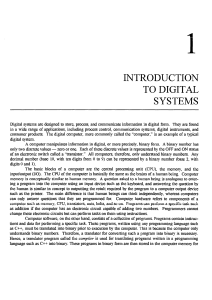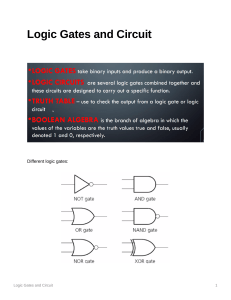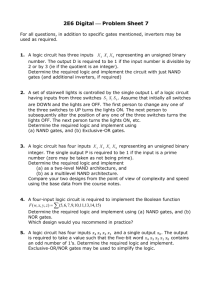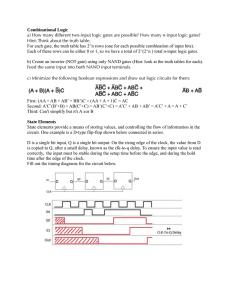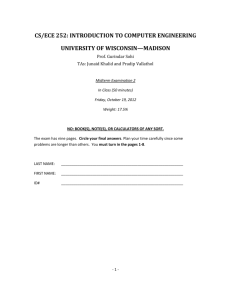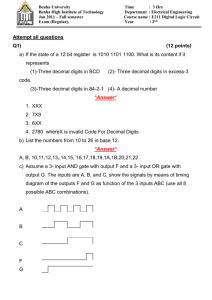Electronics Tutorial Sheet: Number Systems, Logic, Circuits
advertisement
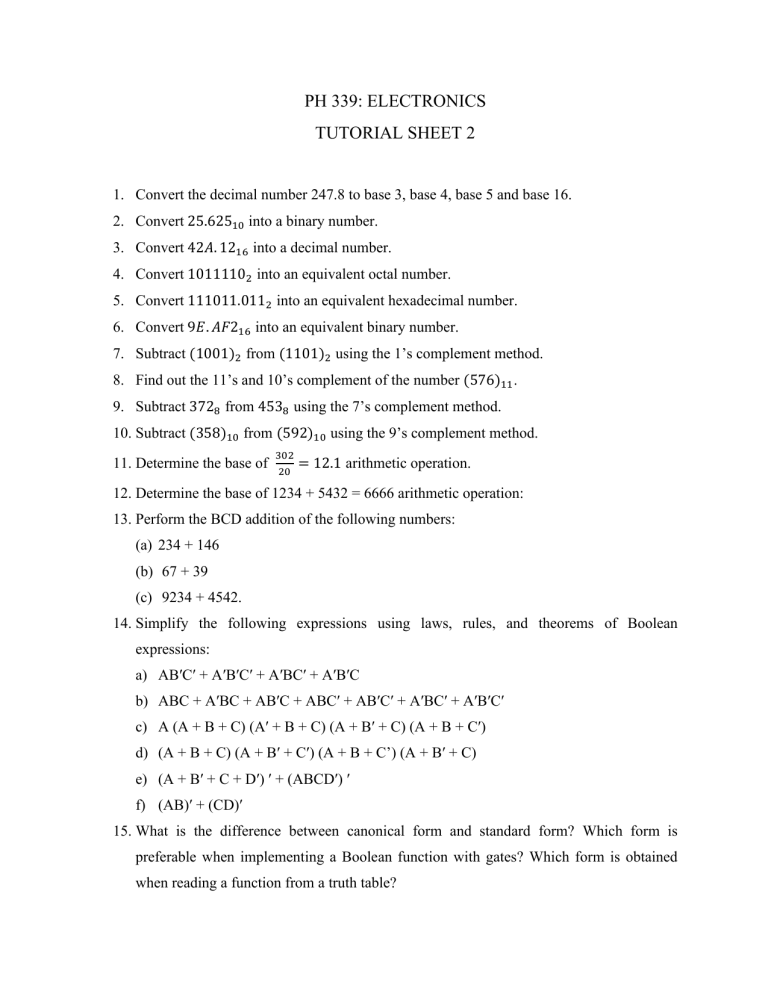
PH 339: ELECTRONICS TUTORIAL SHEET 2 1. Convert the decimal number 247.8 to base 3, base 4, base 5 and base 16. 2. Convert 25.62510 into a binary number. 3. Convert 42𝐴. 1216 into a decimal number. 4. Convert 10111102 into an equivalent octal number. 5. Convert 111011.0112 into an equivalent hexadecimal number. 6. Convert 9𝐸. 𝐴𝐹216 into an equivalent binary number. 7. Subtract (1001)2 from (1101)2 using the 1’s complement method. 8. Find out the 11’s and 10’s complement of the number (576)11 . 9. Subtract 3728 from 4538 using the 7’s complement method. 10. Subtract (358)10 from (592)10 using the 9’s complement method. 11. Determine the base of 302 20 = 12.1 arithmetic operation. 12. Determine the base of 1234 + 5432 = 6666 arithmetic operation: 13. Perform the BCD addition of the following numbers: (a) 234 + 146 (b) 67 + 39 (c) 9234 + 4542. 14. Simplify the following expressions using laws, rules, and theorems of Boolean expressions: a) AB′C′ + A′B′C′ + A′BC′ + A′B′C b) ABC + A′BC + AB′C + ABC′ + AB′C′ + A′BC′ + A′B′C′ c) A (A + B + C) (A′ + B + C) (A + B′ + C) (A + B + C′) d) (A + B + C) (A + B′ + C′) (A + B + C’) (A + B′ + C) e) (A + B′ + C + D′) ′ + (ABCD′) ′ f) (AB)′ + (CD)′ 15. What is the difference between canonical form and standard form? Which form is preferable when implementing a Boolean function with gates? Which form is obtained when reading a function from a truth table? 16. Realize the function F = (A + B) (A’ + C) (B + D) by (i) basic gates, (ii) NAND gates only, (iii) NOR gates only. 17. Realize the function F = (AB)′ + A + (B + C) ′ NAND gates only. 18. Realize the function F = (A + C) (A + D′) (A + B + C′) using NOR gates only. 19. Realize the function F = (A + C) (B′ + D′) (A′ + B′ + C′) with multilevel NAND gates. Use 2-input NAND gates only. 20. Prove that (X + Y) ⊕ (X + Z) = X′ (Y ⊕ Z). 21. Design a logic circuit that squares of 3-bit numbers. 22. A corporation having 100 shares entitles the owner of each share to cast one vote at the shareholders’ meeting. Assume that A has 60 shares, B has 30 shares, C has 20 shares, and D has 10 shares. A two-third majority is required to pass a resolution in a shareholders’ meeting. Each of these four men has a switch which he closes to vote YES and opens to vote NO for his percentage of shares. When the resolution passed, one output LED is ON. Derive a truth table for the output function and give the sum of product equation for it. 23. Seven switches operate a lamp in the following way; if switches 1, 3, 5, and 7 are closed and switch 2 is opened, or if switches 2, 4, and 6 are closed and switch 3 is opened, or if all seven switches are closed the lamp will glow. Use basic gates to show how the switches are to be connected. 24. A third-year physics student designed an electronic system with four input variables which give the output 1 when exactly two or three of its variables are equal to 1 otherwise, the output equals 0. a) Write the truth table from designed system. b) Obtain his minimized cost logic circuit. 25. Design a simplified combinational circuit that generate the 1’s complement of an excess3 decimal digits. Assume in both cases that input combinations not corresponding to decimal digits give don’t care outputs. 26. Implement the given function using a multiplexer, F (A, B, C) = (1, 3, 5, 6) 27. Design a combinational circuit for a BCD to seven-segment decoder. 28. Design a BCD-to-Excess-3 code converter. 29. Design a logic diagram for an addition/subtraction circuit, using a control variable P such that this operates as a full-adder when P = 0 and as a full-subtractor for P = 1. 30. Explain a 3-to-8 decoder with logic diagram. 31. Design a combinational circuit for a BCD-to-gray code using a) standard logic gates, b) decoder, c) 8-to-1 multiplexer, and d) 4-to-1 multiplexer. 32. What is the difference between a latch and a flip-flop? 33. Design of a MOD-10 (or BCD or Decade) Counter (use T-flip flop) 34. Design a synchronous counter that has the following sequence: 0010, 0110, 1000, 1001, 1100, 1101, and repeat. From the undesired states the counter must always go to 0010 on the next clock pulse.
